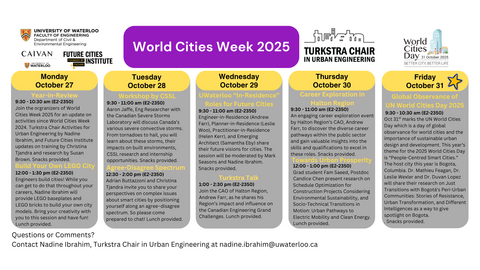World Cities Week
World Cities Week Schedule of Events

Urban Design Days
Design Days are a two-day event where students work in groups to propose a solution to a design problem which incorporates concepts from their core academic curriculum. Funded by the Office of the Associate Vice President, Academic, and administered by the Centre for Teaching Excellence, Urban Design Days are Design Days with an urban theme, and will be introduced in winter 2020 to promote interdisciplinary design and communication through experiential learning. Planning is already underway.
How cities grow and function is the endeavour of engineers and planners, among others, however, urban topics are taught in independent siloed courses, and undergraduates in these disciplines lack the opportunity to work collaboratively together in creative design settings. An experiential learning opportunity is proposed as a two-day design event for students in both the Department of Civil and Environmental Engineering and in the School of Planning. The project activity seeks to promote interdisciplinary design thinking through communication and leadership, both within and among teams, thereby breaking the silos and creating learning synergies. The project will investigate experiential learning by engaging student teams in designing neighbourhoods, and collectively all teams contribute to designing the whole city, while exploringintradisciplinary and interdisciplinary communication as an innovation to the pedagogy for urban studies. The students’ success will be measured by the communication to develop the neighbourhood elements and to assemble and connect neighbourhoods to form the overall city.
The University of Waterloo’s Learning Innovation and Teaching Enhancement (LITE) Grants fund projects investigating innovative approaches to enhancing teaching and fostering deep student learning at Waterloo. Since 2012, recipients across campus have used LITE-Grant funding to explore topics ranging from transcultural learning to ePortfolios, Communities of Practice to undergraduate teamwork development workshops, peer review of teaching to information literacy, and more..
City Circle
City Circle is a lunch hour discussion that is held weekly for undergraduate students and is introduced and facilitated by the Turkstra Chair in Urban Engineering, Nadine Ibrahim, to learn about our urban world, one city at a time. The discussions introduce thought-provoking topics from global cities, and present urban infrastructure challenges and opportunities for discussion. The discussion format includes sitting in a circle to encourage participation and peer-to-peer learning, which is inspired by the “talking circle” or “circle talks” as a traditional way for indigenous culture to solve problems. City Circle will follow a foundational approach to First Nations pedagogy because it provides a model for an educational activity that encourages dialogue, respect, and co-creation of learning content.

This initiative was started in spring 2019, covering the following topics:
- Water scarcity in Cape Town, South Africa
- Superblocks in Barcelona, Spain
- Circular economy in Quito, Ecuador
- High speed rail in Tokyo, Japan
- Energy to waste in Singapore, Republic of Singapore
- Rapid urbanization in Dubai, United Arab Emirates
- Rising sea levels in cities in the Netherlands
- Informal dwelling in Mumbai (Dharavi), India
- Megacity planning in Lagos, Nigeria
- Smart cities in Toronto (Sidewalk Labs), Canada
Coming again in winter 2020 - meeting times to be determined
Bring your own lunch, and come for dessert.
Urban Provocations
Quite simply, provocations provoke! Urban Provocations is a weekly discussion forum for graduate students to provoke thoughts, discussions, questions, and creativity, and expand on interests and ideas around our urban environments, and around cities more broadly. Ultimately, the intention of Urban Provocations is to provide an invitation for urban exploration and self-expression.
Urban Provocations (poster PDF) is a group discussion brought to you by the Turkstra Chair in Urban Engineering, and structured around the “six thinking hats” format which is a very effective tool for group discussions that encourages participants to think together. Participants are assigned a colour card and are asked to play the role represented by the colour during the discussions (eg. neutral facts, feeling, negative judgement, positive judgement, creative thinking, and big picture). Several rounds of discussions will enable participants to take on a variety of roles. A provocative paper, academic publication or news article will be selected and circulated one week in advance for reading, so feel free to also suggest reading material of interest to the group.
Snacks will be provided.
Meeting times in fall 2019 – Wednesdays, 2-3pm in Engineering 2 (E2)-3356